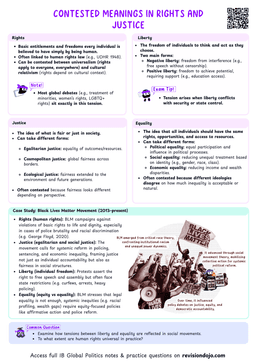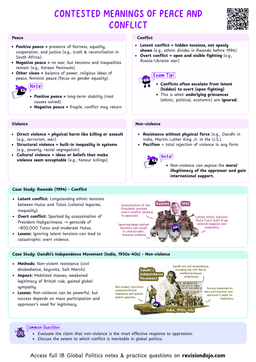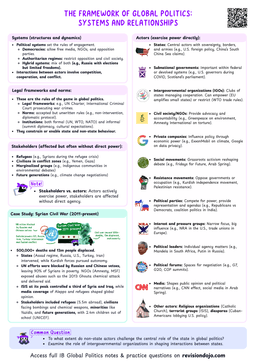Key Concepts of Rights and Justice
1. Power
- The ability to effect change, central to global politics.
- Shapes relationships and the enforcement of rights/justice.
2. Sovereignty
- A state's right to self-govern.
- Central to debates over how and whether states uphold human rights.
3. Legitimacy
- Acceptance of authority by others.
- Key in evaluating the credibility of governments, IGOs, NGOs, and courts in justice matters.
4. Interdependence
- Mutual reliance among actors (states, groups, regions).
- Impacts how rights and justice are understood and enforced globally.
5. Equality
- All people have equal intrinsic value.
- Tied to rights and justice, highlights how inequality affects access and outcomes.
6. Liberty
- Negative liberty: freedom from coercion.
- Positive liberty: freedom to act.
- Crucial to rights-based frameworks.
7. Justice
- Concerned with fairness and rightful treatment.
- Complex is key in understanding what individuals or groups are owed.
8. Rights
- Linked to dignity and personal freedom.
- Seen as essential for a just society and a dignified life.
Understanding Rights
1. Types of Human Rights
Rights
Rights are entitlements or permissions that individuals or groups have, often protected by law or moral principles.
- Human Rights: Universal rights inherent to all humans, regardless of nationality, gender, or other status.
- Civil and Political Rights: Rights that protect individual freedoms, such as freedom of speech and the right to vote.
- Economic, Social, and Cultural Rights: Rights that ensure access to essential resources and opportunities, like education and healthcare.
- The Universal Declaration of Human Rights (UDHR) outlines a broad range of rights, including the right to life, liberty, and security (Article 3) and the right to education (Article 26).
2. Characteristics of Human Rights
- Universality: Applicable to all people, everywhere.
- Indivisibility: All rights are interconnected and equally important.
- Inalienability: Rights cannot be taken away, though they may be restricted under specific circumstances (e.g., during a state of emergency).
- While human rights are universal, their interpretation and implementation can vary across cultural and political contexts.
Exploring Justice
1. Definition and Dimensions of Justice
Justice
Justice refers to the fair and equitable distribution of resources, opportunities, and treatment.
- Distributive Justice: Focuses on the fair allocation of resources and wealth.
- Procedural Justice: Ensures fair and transparent decision-making processes.
- Retributive Justice: Involves punishment for wrongdoing, often in a legal context.
- Restorative Justice: Aims to repair harm and restore relationships between offenders and victims.
- The International Criminal Court (ICC) embodies retributive justice by prosecuting individuals for crimes like genocide and war crimes.
2. Theories of Justice
- John Rawls: Advocated for distributive justice through his concept of the " veil of ignorance," which ensures fairness by designing society without knowing one's position within it.
- Amartya Sen: Emphasized the importance of capabilities, the real freedoms people have to achieve their potential.
- When analyzing justice, consider how different theories prioritize equality, freedom, and fairness in various contexts.
The Interplay Between Rights and Justice
- Mutual Reinforcement: Rights and justice often support each other. For example, protecting human rights can lead to a more just society.
- Tensions and Conflicts: Conflicts can arise when rights compete, such as balancing freedom of speech with protection against hate speech.
The Rwandan Genocide (1994): Human Rights vs State Sovereignty
- Event: Approx. 800,000 Tutsi civilians killed in 100 days.
- Issue: International community failed to intervene, citing respect for sovereignty and lack of mandate.
- Tension: Showed conflict between non-intervention and the need to protect human rights.
- Impact: Exposed flaws in the global system's response to mass atrocities.
- Legacy: Influenced the creation of the Responsibility to Protect (R2P), which redefines sovereignty as conditional on protecting citizens.
Case Studies
The Universal Declaration of Human Rights (UDHR)
- Adopted in 1948, the UDHR is a foundational document that outlines universal human rights.
- It has inspired legally binding treaties like the International Covenant on Civil and Political Rights (ICCPR) and the International Covenant on Economic, Social, and Cultural Rights (ICESCR).
- The UDHR is not legally binding, but it serves as a moral and political guide for nations.
The International Criminal Court (ICC)
- Established in 2002, the ICC prosecutes individuals for crimes like genocide, war crimes, and crimes against humanity.
- It embodies the principle of retributive justice but faces challenges, such as accusations of bias and limited enforcement power.
- Identify three key characteristics of human rights.
- Explain the difference between distributive and procedural justice.
- Provide an example of a tension between rights and justice in a real-world context.
- How do our cultural perspectives shape our understanding of rights and justice?
- What challenges arise when attempting to apply universal principles in diverse cultural contexts?


